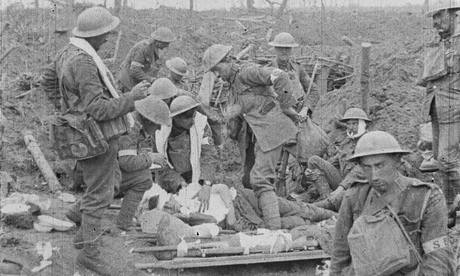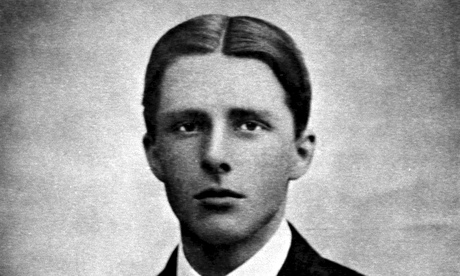While he was locked up in an asylum, the great war poet and composer Ivor Gurney wrote hundreds of songs and poems that have never been seen or heard in public.
Dismissed as “too crazy” to publish during his lifetime, they reveal a startling new side to Gurney’s genius, according to a new biography of the poet, Dweller in Shadows – A Life of Ivor Gurney by Dr Kate Kennedy, that comprehensively considers his unpublished work for the first time.
Gurney, who wrote some of the most anthologised poems of the first world war and composed lauded English songs such as Sleep, suffered with manic depression through much of his life and became suicidal and delusional after the war ended. Declared insane by his family in 1922, he was incarcerated in a psychiatric hospital until his death 15 years later, aged 47, of tuberculosis.
While living in the asylum, as well as attempting to escape three times, he wrote more than 650 poems, 200 musical compositions and a handful of plays. But because of his diagnosis, most were not deemed worthy of publication and have lain in a library archive for nearly 100 years.
Kennedy, a fellow at the University of Oxford, was granted rare access to the unpublished manuscripts and is one of only a handful of people ever to have read them. “In two genres, he’s telling us what it feels like to be forgotten, to be isolated, to be fighting for your own mental survival. And we can’t hear that voice, because most of it’s not published and we don’t have the right context.”
It’s extraordinary, she says, to find a great poet and composer, who was very confident in his technique, going into his mature period and having no audience. “There’s almost no other example I can think of.”
In many ways, there is a sense this is “a disaster” for Gurney. “But it’s also a kind of liberation, that he can write what he wants and experiment in whatever direction he likes.”
As a result, she says, “he developed a wonderfully eccentric, eclectic style. But without understanding the situation in which he’s writing, these references can appear crazy”.
Academics are currently hard at work to enable Oxford University Press to publish all the asylum poetry Gurney wrote in a way that allows it to be understood. “What he’s writing is fascinating, if you give it time. It’s not a matter of saying it’s all totally sane, because it may well not be, but it is extremely interesting,” says Kennedy. “And it tells you something of the way the mind works, when it is totally isolated and free to range in whatever way it wants.”
He often writes in beautiful, granular detail about a landscape he can only see in his mind’s eye. “He has this gift to be able to capture the sound of wind through the trees or the squelch of wet leaves in a wood. But his experience of landscape is limited to the asylum grounds.” Tragically, there were times when he was only allowed access to a concrete yard.
Until now, Kennedy feels there has been a “double silencing” of Gurney as an asylum inmate. “Not only did his work not get published or reviewed or heard, but anything he wrote while he was in the asylum has been treated with suspicion.” This includes his compositions. “If he writes a slightly eccentric chord sequence of a song – and you think, gosh, why are we in F sharp minor all of a sudden, that’s odd – it’s been seen as a mistake, a symptom of his madness. Now if [Alexander] Scriabin or [Igor] Stravinsky did that, we’d think it was fantastic. It would be expressive and genius. But for Gurney, it’s crazy.”
The few compositions that were published are now widely held to be masterpieces. “Those are the canonical songs that lots of music college students will sing in their final recital.”
Some of Gurney’s unpublished songs will be heard for the first time on BBC Radio 3 in a documentary presented by Kennedy on 20 June.
During her 15 years of research for the biography, she unearthed evidence that Ralph Vaughan Williams frequently visited Gurney, his former pupil, at the asylum. Vaughan Williams would play the songs Gurney had been writing on the asylum piano and discuss them with him.
“Here are 200 songs that no one’s really looked at and many have been worked through by Vaughan Williams. They are not just scribblings in insanity, they are actually being endorsed by one of the greatest voices in British music. And they are very often extraordinary.”











